-
August-Wilhelm Scheer
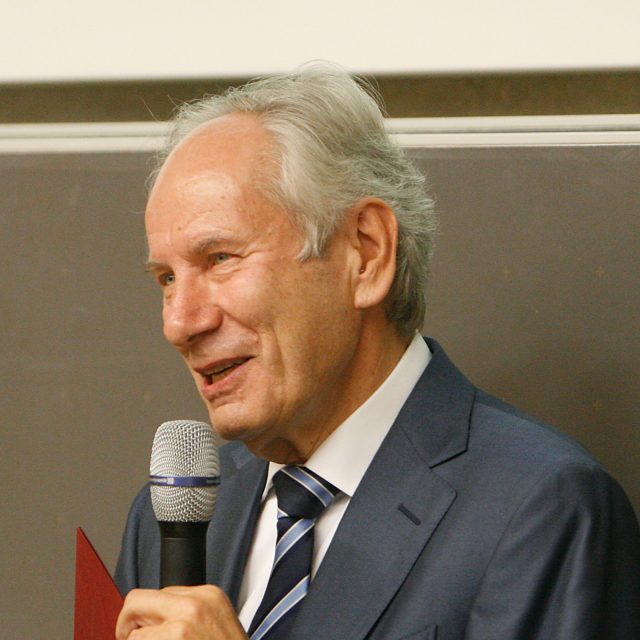
-
Horst Steinmann
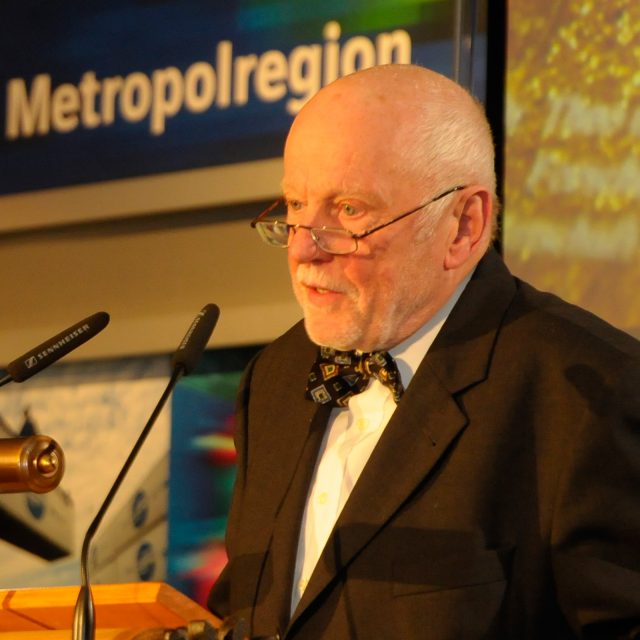
-
Jürgen Mittelstraß
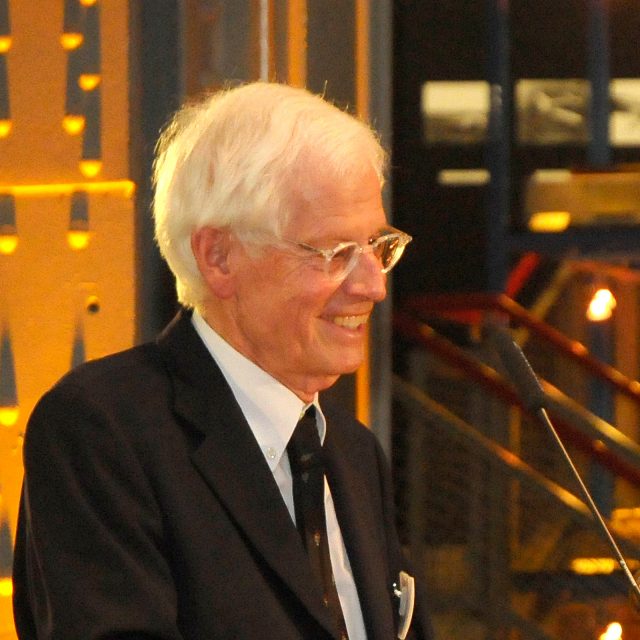
-
Peter Mertens
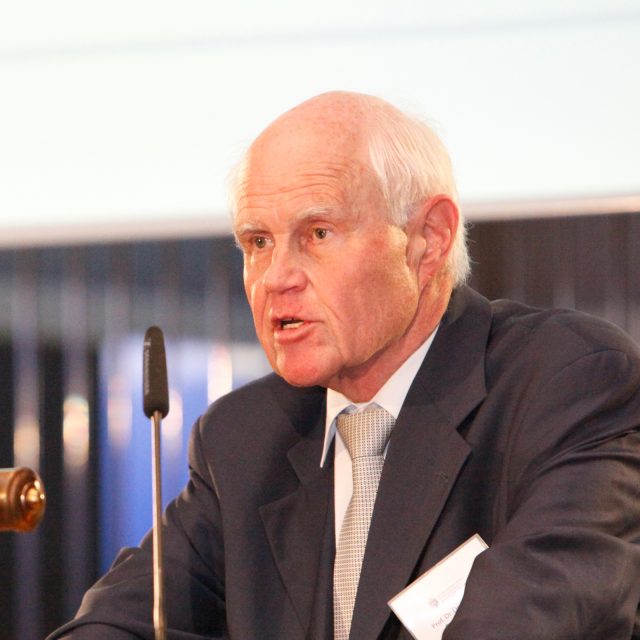
-
Hans-Jörg Bullinger
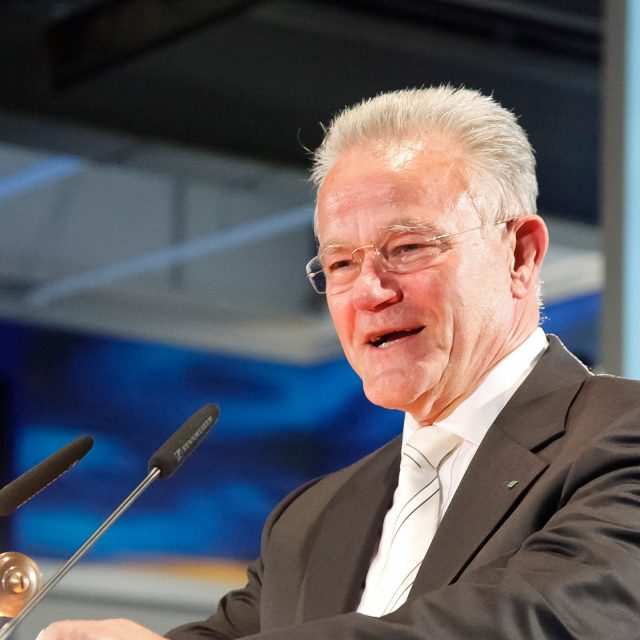
-
Helmut Haussmann
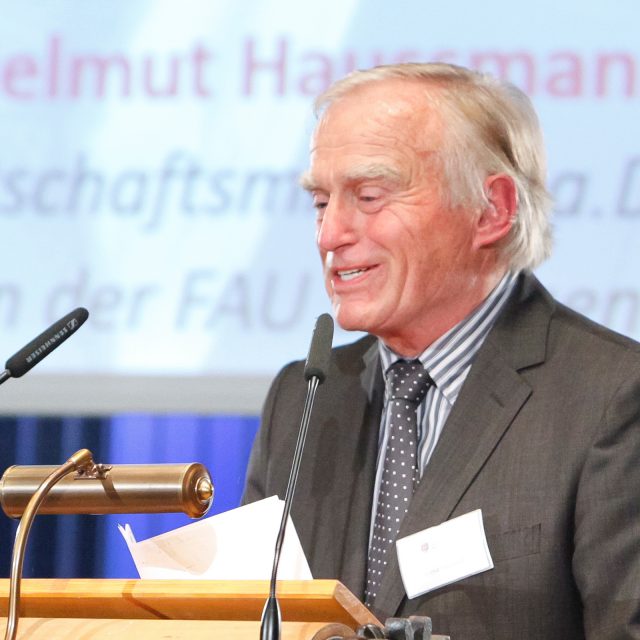
-
Karl-Dieter Grüske
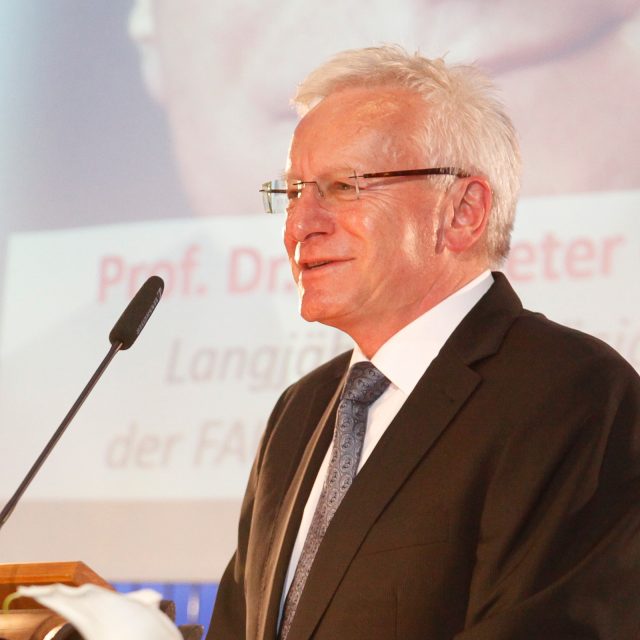
-
Frank-Jürgen Weise
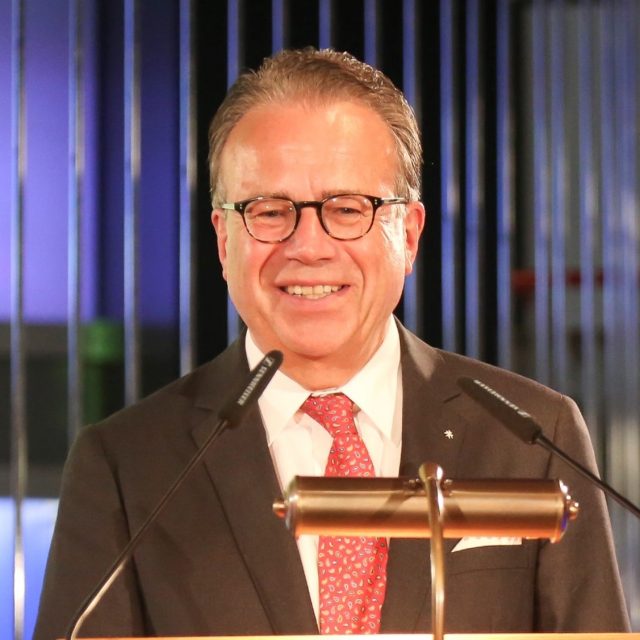
-
Thomas A. H. Schöck
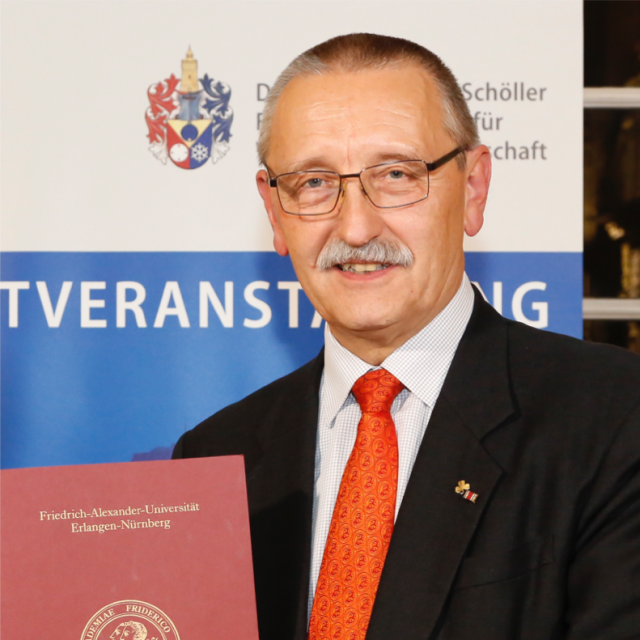
-
Alfred Estelmann
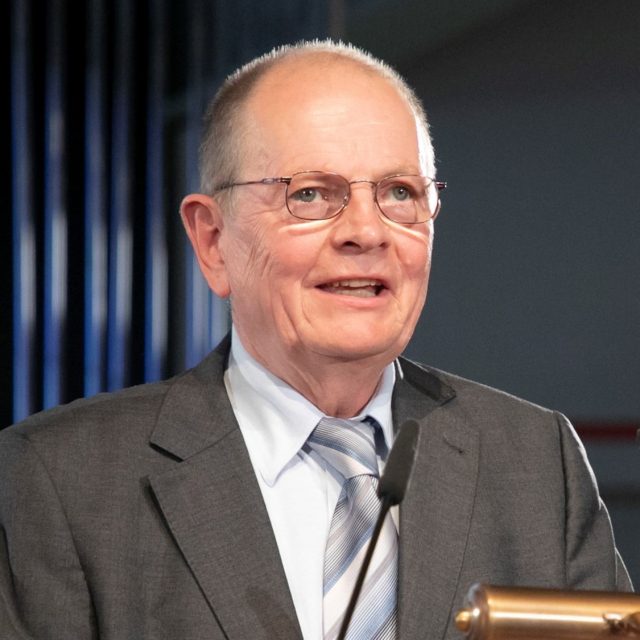
-
Evi Kurz
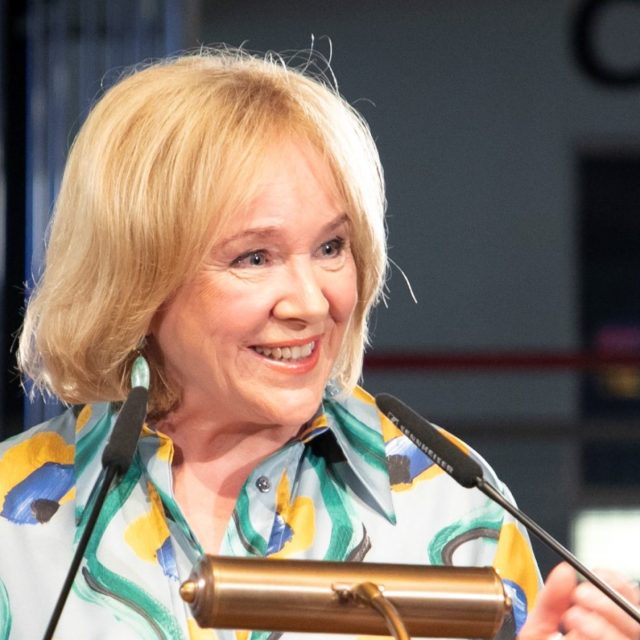
-
Walter Bockshecker
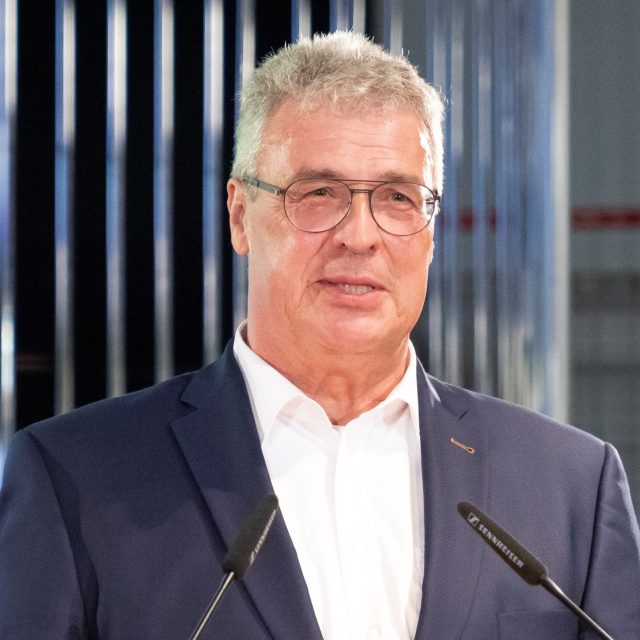
-
Otmar Issing
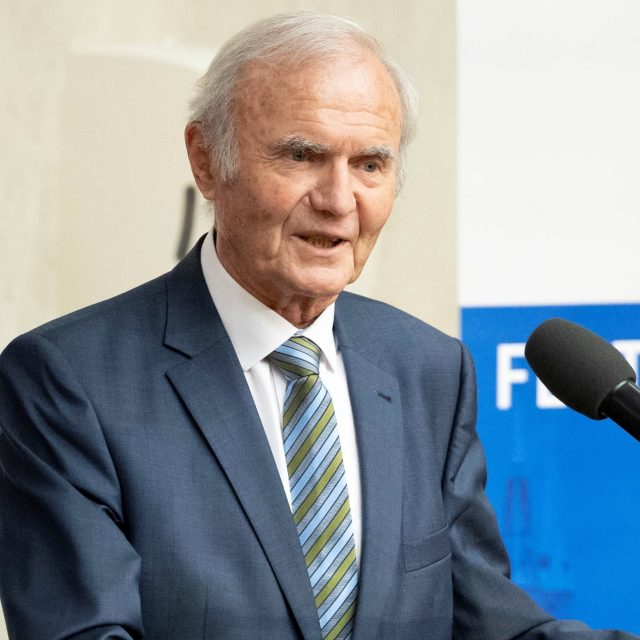
Prof. Dr. Dr. h.c. mult. August-Wilhelm Scheer, born on July 27th 1941, was director of the Institute for Information Systems (IWi) at the German Research Center for Artificial Intelligence (DFKI) at Saarland University from May 1979 until February 2005, with his major field of research being information and business process management in manufacturing, service industry and administration. Since March 2005, he is a consulting professor at DFKI.
In 1984, he founded the international software and consulting company IDS Scheer AG which maintains subsidiaries in 27 countries. In 1991, the book „ARIS Architektur integrierter Informationssysteme – Grundlagen der Unternehmensmodellierung“, which contains the basic design of the ARIS Toolsets developed by IDS, was released. In 1997, he founded IMC AG (Information Multimedia Communication AG) and is supervisory board chairman of both companies today.
In 1997, Professor Scheer was awarded the honorary doctorate of the Pilsen University (Czech Republic) for his scientific merits for the development of methods to design information systems and for the analysis of business processes. Since November 1999, he is the Saarland’s minister-president’s authorized representative for the fields of innovation technology and research.
In 2001, he founded the August Wilhelm Scheer foundation for science and art. In July 2001, he was awarded the Order of Merit of the Saarland by its minister-president. In October 2001, he was awarded an honorary doctorate by the Hohenheim University. In October 2003, he was named Entrepreneur of the Year in the category “Information Technology”.
In 2005, he was awarded the Erich-Gutenberg-Prize and the Federal Cross of Merit, First Class, of the Order of Merit of the Federal Republic of Germany. Since 2006, he is a member of the Advisory Board for Innovation and Growth of the Federal Republic of Germany. In 2007, he was elected president of the Federal Association for Information Technology, Telecommunications and New Media (BITKOM).
Prof. Dr. Dr. h.c. mult. Horst Steinmann, born 17 July 1934 in Bad Salzuflen, Lippe, graduated in 1962 at the TU Clausthal where he also habilitated five years later. Moreover, he obtained a Master’s degree in Business Administration with highest distinction at the Institut Européen d’Administration des Affaires (INSEAD) in 1965. In 1968, he became Chair of Operations Research at the Freie Universität Berlin. In 1970, he left for the University of Erlangen-Nuremberg where he took over the Chair of Management.
During his time at the University of Erlangen-Nuremberg, he received several offerings from various universities (Paderborn, Darmstadt, Freie Universität Berlin) but turned down all of them. Furthermore, he was conferred honorary doctorates by the Department of Economics at the University of Bern, Switzerland, in 1996 and the Robert Schumann University in Strasbourg, France, in 1999 for his widely noticed work in the field of Management and particularly in the field of Business Ethics. A large number of his graduate students, doctoral students, and post-doctoral students have become renowned researchers or practitioners.
Besides his appointment as university professor, he founded the European Business Ethics Network (EBEN) in 1986 and the German Business Ethics Network (DNWE) in 1993, whose president he was until 2000. Furthermore, he is a member of the US-based Academy of Management and Society for Business Ethics as well as of the German Academic Association for Business Research. He also officiated as deputy chairman for the latter from 1979 to 1980.
His research focus lies on the fields of Operations Research, Corporate Governance, Human Resource Management, Strategic Planning and Control, Organizational Theory, Business Ethics and Economic Theory. He continues to hold lectures and write articles. He published 300 papers and 25 books as a (co-)author or (co-)editor, respectively, many of which have been translated into Polish, Czech, Japanese, and Chinese.
Prof. Steinmann was honored with the Medal of Honor of the School of Business, Economics and Society.
Prof. Dr. phil. Dr. h.c. mult. Dr.-Ing. E.h. Jürgen Mittelstraß, born in 1936 in Düsseldorf, studied philosophy, German studies, and Protestant theology in Bonn, Erlangen, Hamburg, and Oxford. In 1961, he received his Ph.D. at the University of Erlangen-Nuremberg, where he habilitated in 1968. Two years later, he was appointed professor of philosophy and philosophy of science at the University of Konstanz. From 1990 to 2005, he was director of the Center of Science and Philosophy. Currently, he is the chairman of the Austrian Science Council in Vienna and also works as director of the Science Forum in Konstanz.
The philosopher and scientific theorist has been a member of several renowned academic institutions and academies. He was a member of the Academia Europaea (from 2002 to 2008 as president), the Science Council, the Senate of the German Research Council as well as the Council for Research, Technology, and Innovation to the Federal Chancellor. Furthermore, he was President of the General Society for Philosophy in Germany and a founding member of the German-American Council. In 2010, Professor Mittelstraß was appointed to the World Commission for Ethics in Science and Technology (COMEST), an advising organ of UNESCO.
From 2000 to 2007, he received honorary Ph.D. degrees from six prestigious national and international universities as well as the honorary senator degree at the University of Erlangen-Nuremberg. In addition, he was honored with the Leibniz Prize of the German Research Council and the Federal Cross of Merit 1st Class.
Professor Mittelstraß’ research deals mainly with questions from the general scientific theory, history of philosophy and science, epistemology, philosophy of language, and cultural theory. Influenced by the constuctivist concept of the Erlangen school of philosophy, he is considered one of the main founders and representatives of the Konstanz school of philosophy. Furthermore, he is the editor of the “Enzyklopädie Philosophie und Wissenschaftstheorie” (Encyclopedia of Philosophy and Philosophy of Science).
Prof. Dr. Dr. h.c. mult. Peter Mertens (born in 1937) studied industrial engineering at the Technische Hochschule Darmstadt, where he also did his doctorate in 1961. He then worked at the Technische Universität in Munich, the Johannes Kepler University in Linz as well as at the Massachusetts Institute of Technology (MIT). In 1966, Peter Mertens submitted the first habilitation paper in the German-speaking world on business informatics at the Technische Universität in Munich: “Inter-Company Cooperation and Integration in Automated Data Processing”. Subsequently, he worked as a CEO for a consultancy in Zurich.
In 1968, he hold the first chair in the German-speaking world, which concentrated on corporate information processing at the University in Linz. From 1970 until 2005, Peter Mertens was head of the Chair of Information Systems I at the School of Business and Economics at the University Erlangen-Nuremberg. At the same time, he was the director of the research group “Betriebliche Anwendungen” at the Faculty of Engineering. Since its foundation in 1999 until 2011, he taught at the “Bayerische Elite Akademie”.
Including the adapted editions and translations into Chinese, English, Italian and Russian, Peter Mertens published 77 books and nearly 600 articles in journals and edited books and volumes. His monograph “Integrierte Informationsverarbeitung 1: Operative Systeme in der Industrie” was released in 18 editions.
Peter Mertens was co-director of the Regional Computer Centre Erlangen for many years, member of the “Senatskommission für Rechenanlagen der Deutschen Forschungsgemeinschaft”, board member and chairman of the “Verband der Hochschullehrer für Betriebswirtschaft”, member of the presidium of the “Gesellschaft für Informatik”, and editor-in-chief of the journal WIRTSCHAFTSINFORMATIK.
Peter Mertens is fellow of the “Gesellschaft für Informatik”, honorary member of the “Verband der Hochschullehrer für Betriebswirtschaft” as well as honorary doctorate at the Universities in Augsburg and Bern, at the TU Darmstadt, the Otto Beisheim School of Management in Koblenz-Vallendar, and the University of Economics and Business in Vienna. He was honored with the Federal Cross of Merit, the Ring of Honor of the University of Economics and Business in Vienna, and the Medal of Honor of the School of Business, Economics and Society.
Prof. Dr.-Ing. habil. Prof. E.h. mult. Dr. h.c. mult. Hans-Jörg Bullinger, born in 1944, studied mechanical engineering (specializing in production engineering) and received his Ph.D. at the University of Stuttgart. In 1975, a year after his doctorate, he became head of the Fraunhofer Institute for Manufacturing Engineering and Automation (Fraunhofer IPA) in Stuttgart. After his habilitation, he was appointed Professor of Industrial Science/Human Engineering at the University of Hagen. In 1982, he was became Chair of Industrial Science and Technology Management at the University of Stuttgart. Hans-Jörg Bullinger was director of the Fraunhofer IAO from 1981 to 2002 and President of the Fraunhofer Society (Fraunhofer Gesellschaft) from 2002 to 2012. Since 2013, he is member of the Fraunhofer Senate.
The Otto Kienzle commemorative medal awarded by the German university association of production engineers (Hochschulgruppe Fertigungstechnik), the VDI gold award as well as the Arthur-Burkhardt-Prize are among Hans-Jörg Bullingers’s numerous national and international awards. Moreover, he received the Medal for Merit of Baden-Württemberg, the Grashof commemorative medal of the Association of German Engineers (VDI), the Leonardo European Corporate Learning Award in the category Thought Leadership as well as the Hans Peter Stihl prize. In 2009, he was selected Manager of the Year by the Manager Magazin.
Hans-Jörg Bullinger received honorary doctorates at the University Novi Sad (Serbia-Montenegro) and the Polytechnic University Temeswar (Romania) as well as the honorary professor at the University of Science and Technology of China in Hefei (China). He was honored with the Order of the Federal Republic of Germany, medal and ribbon for outstanding services to German science, industry and society (1998); the First Class Order of the Federal Republic of Germany (2003) for extraordinary services to German science and research; and the Order of merit of the Federal Republic of Germany for promoting the transfer of knowledge between science and industry (2006). In 2012, he received the Knight Commander’s Cross of the Order of Merit of the Federal Republic of Germany.
Prof. Dr. Helmut Haussmann, born in 1943 in Tübingen, studied economics and social sciences in Tübingen, Hamburg, and Nuremberg. After he finished his diploma studies in 1968, he became the executive director of the company Berninger & Spilcke KG in Bad Urach. From 1971, he was Assistant Researcher at the Chair of Business Management at the FAU Erlangen-Nuremberg where he received his Ph.D. in 1975.
Helmut Haussmann’s political career started in 1975 when he became town councilor in Bad Urach and regional chairman of the Free Democratic Party (FDP) in Reutlingen. As a member of the German Bundestag (1976-2002) and secretary general of the FDP (1984-1988), Helmut Haussmann was appointed Minister of Economics of the Federal Republic of Germany from 1988 to 1991. From 1991 to 2002, he became a member of the Federal Committee on Foreign Affairs and a Speaker for European Affairs of the FDP in the German Bundestag. Currently, he is a representative of the Cabinet of Germany in the Board of the Asia-Europe-Foundation (ASEF), Singapore.
Since 1991, Helmut Haussmann is Vice President of the international IT- and consulting firm Capgemini in Berlin. He is a member of various national and international committees and advisory boards. Helmut Haussmann is honorary professor at the Chair of International Management at the FAU Erlangen-Nuremberg. His research focuses on the role of medium sized companies in the process of globalization. Moreover, he is a guest professor for International Business at the Eberhard-Karls-University Tübingen. Since 2021, he is on the board of trustees of the Bundeskanzler-Helmut-Kohl-Stiftung (Federal Chancellor Helmut Kohl Foundation).
Since 1996, he is a a member of the board of trustees of the Friedrich-Naumann-Foundation and the Theodor-Heuss-Haus-Foundation. Helmut Haussmann is Commander of the French Legion of Honor and was honored with the Order of Merit of the Federal Republic of Germany and the Medal of Honor of the FAU Erlangen-Nuremberg. He is honorary chairman of the Reutlingen County Chapter of the FDP and since 2022 honorary citizen of the city of Bad Urach.
Prof. Dr. Karl-Dieter Grüske, born 1946 in Erlangen, studied economics in Erlangen/Nuremberg (FAU) and Munich. From 1972 to 1988, he was assistant and associate professor under Prof. H.C. Recktenwald in the Department of Economics at the Faculty of Business Administration, Economics and Social Sciences at FAU. In 1978, he completed his doctoral thesis “summa cum laude” on distribution effects of public budgeting. For his habilitation thesis in 1986 he received both an FAU award and the prestigious Wolfgang-Ritter-Preis (Bremen). In 2010, Karl-Dieter Grüske was awarded the Order of Merit by the Federal President of Germany. In 2015, he was awarded the Medal of the Bavarian Constitution.
During research stays abroad, he spent time in Indonesia (1974), Yemen (1982), China (1985) and the USA (1987). From 1988 to 1990, he was academic project manager under Prof. Meinhard Miegel at the Bonn Institute for Economics and Social Research. In 1990, he was offered a chair at the Bundeswehr University, Hamburg. In 1991, he accepted the Chair of Public Finance at FAU. He is a member of all the important societies and associations in his discipline, and has published three books and numerous scientific papers and is co-editor of the renowned ‘Klassiker der Nationalökonomie’ (Classics of Political Economy), among other works.
Due to his vast knowledge and experience, Karl-Dieter Grüske is a valued member of numerous committees. In 1993, he was appointed as a member of the Advisory Council for Family Affairs at the Federal Ministry for Family Affairs, Senior Citizens, Women, and Youth, a position which he held until 2010. From 1997 to 2000, he was a member of the Advisory Council for Administrative Reform of the Hessian Ministries and Universities; he has also been involved in several other committees for university reforms and a member of the standing committees for economics and education economics in Verein für Socialpolitik (German Economic Association). From 1999 to 2003, he also acted as a member of the Advisory Council of the German Institute for Youth in Munich. During the years 1993 to 2006, he served as chairman of the Gesellschaft für Finanzwissenschaftliche Forschung (Society for Research in Public Finance). In 2008, he became honorary professor of the University for International Business and Economics in Beijing. He was a member of the DAAD’s Board of Trustees from 2012 to 2015.
Between 1994 and 1996, Karl-Dieter Grüske was dean of the Faculty of Business Administration, Economics and Social Sciences, from 1996 to 2000, he served on the Senate, and from 2000 to 2002 as prorector of the University. From April 2002 to March 2015, he was rector and then, after the office was renamed in 2010, president of FAU Erlangen-Nuremberg. After two years as deputy speaker, he was chairman of Universität Bayern e.V from 2009 to 2011. He was vice president for research of the German Rectors’ Conference (HRK) from 2008 to 2014.
Since his retirement on 1 April 2015, he has continued to fulfil a variety of roles, including as chairman of the Advisory Board for Research Migration at the Federal Office for Migration and Refugees, vice president of the Virtual University of Bavaria, and a member of the HRK’s Executive Board, the Board of Trustees of the Max Planck Institute for the Science of Light, the Advisory Board of the Fraunhofer Institute for Integrated Circuits IIS, various HRK commissions, the Advisory Board of Sparkasse Nuremberg and two supervisory boards, and as honorary chairman of the Confucius Institute Nürnberg-Erlangen. He also acts as a reviewer (e.g. in evaluation committees) and as a speaker on higher education policy.
From 2004 until 2017, Dr. h.c. Frank-Jürgen was CEO of the German Federal Agency for Employment and, from 2015 until 2016, he also headed the Federal Office for Migration and Refugees.
He started his professional career in the German Bundeswehr in 1972, where he was trained as an army officer and studied business administration. As company commander (parachutist), he also acted as a youth officer. As reserve officer, he was battalion commander, deputy regimental commander, and deputy in the NATO staff in Brussels with many foreign missions as well as a Deputy Inspector General of the Bundeswehr for recruitment. He currently holds the rank of a reserve colonel.
From 1985, Weise was Controller at the VDO Adolf Schindling AG and from 1989, chairman of the management at the Braunschweiger Hüttenwerk GmbH. He then served as Managing Director of the Societät für Unternehmensplanung in Frankfurt and Basel. From 1997, he was a member of the Executive Board of FAG Automobiltechnik AG in Schweinfurt and, in addition, director of human resources for the executives of the global FAG Group. Weise was co-founder, then CEO of the company Microlog Logistics AG in Frankfurt, which was later sold to the DELTON Holding of Stefan Quandt.
In 2002, he was appointed to the executive board of the German Federal Agency for Employment and was responsible for finance, human resources and information technology. In 2004, he was appointed CEO and resigned from office at the end of March 2017.
In 2010, he was head of the Commission on Structural Reform of the German Bundeswehr. At the end of 2015 until 2016, Weise also headed the Federal Office for Migration and Refugees. In 2017, he was Federal Government Commissioner for Refugee Management.
Weise is a board member of the Post-Foundation, the IZA (Institut der Zukunft der Arbeit, Institute of Labor Economics), the KPS Capital GmbH and Odewald SME II. In addition to his work as a partner at Rantum Capital GmbH, Frankfurt and the company KPS New York, he is Senator of the Deutsche Nationalstiftung (German National Foundation), Chairman of the Board of the non-profit Hertie Foundation and Honorary President of the Johanniter-Unfall-Hilfe.
Dr. Thomas A. H. Schöck studied economics and law from 1968 to 1974 at the Universities Erlangen-Nuremberg and Heidelberg after completing his training as an assistant in auditing and tax consulting. After working for several years as a research assistant and assistant at the University Erlangen-Nuremberg, he joined the Bavarian State Ministry of Finance and the Bavarian State Chancellery in 1980, most recently as head of the department “Cabinet Affairs, Public Budget and European Community”. In addition, he was a lecturer of tax law. On October 1, 1988 he was appointed chancellor (head of the university administration, commissioner for the budget, member of the university management) of the Friedrich-Alexander University Erlangen-Nuremberg (FAU) and retired on June 15, 2014. Until September 30, 2016 he was managing director of FAU Busan GmbH.
He was chairman of the working groups “Problems of University Medicine” and “Employee Invention Law, EU Matters and Third-party Funding Issues” as a spokesman for the chancellors of the German universities as well as founding member and board member of the Center for Science Management. From 1996 to 1999, he was spokesman for the chancellors of the Bavarian universities, from 1999 to 2000 deputy federal spokesman and from 2000 to 2003 federal spokesman for the chancellors of the German universities. From 2004 to 2013, he was chairman of the Administrative Board of the Studentenwerk Erlangen, from 2010 to 2015 member of the Executive Board of the Licensing Executive Society (LES) Germany, from 2013 to 2018 chairman of the Supervisory Board of Weller Brauerei eG (Weller Brewery).
He is currently chairman of the Board of Trustees of the Windsbach Boys Choir, the Board of Trustees of the Nuremberg University of Music, the “Partnerschaftsverein Erlangen-Riverside” (sister city society of Erlangen and Riverside) as well as the “Förderverein Wassersportzentrum Pleinfeld” (Pleinfeld Water Sport Center Society) of the FAU, vice-chairman of the “Stiftung Ludwig Erhard-Haus“ (Foundation Ludwig Erhard-House) and the society “Freunde Fränkischer Sommer” (Friends of the Franconian Summer Music Festival), member of the Supervisory Board of the “Internationale Gluck Opernfestspiele gGmbH” (International Gluck Opera Festival), the “Evangelische Landessynode” (Evangelical Regional Synod) and the Board of Trustees of the “Diakonie Neuendettelsau” (Diaconia Neuendettelsau).
He was honored with the Order of Merit of the Federal Republic of Germany, the “Goldenes Kleeblatt” (Golden Cloverleaf) of the City of Fürth, the Medal of Merit of the German Student Union, and the Equal Opportunities Prize of the FAU. Since 2015, he has been honorary senator and since 2020 honorary doctor of FAU.

Alfred Estelmann
Dr. med. Dipl.-Kfm. Alfred Estelmann (born 1952) was chairman of Klinikum Nürnberg’s Executive Board. Klinikum Nürnberg is a maximum medical care hospital and one of the largest municipal hospitals in Europe.
Estelmann completed his apprenticeship in his parents’ bakery, where he passed his apprenticeship certification exam in 1974. His involvement in the ambulance service sparked his interest in the medical profession. From 1973, he studied business administration at the School of Business, Economics and Society (WiSo) in Nuremberg. In 1975, he got a place at FAU and started his study of human medicine in Erlangen. After completing his preliminary (medical) examination, a research project in emergency medical services led him back to business administration. In 1980, he passed the diploma examination for business administration. At the Computer Center of FAU he got to know the team of the Clinical Cancer Registry of the Surgery Department of Universitätsklinkum Erlangen, which he supported in setting up a hospital-wide identification of tumor and cancer patients. In 1982, he graduated in human medicine.
His medical work began in 1983 at the Children’s Department of Klinikum Nürnberg. From 1985, he simultaneously worked in project groups dealing with integrated data processing and quality management. In 1996, he moved to the Organization Office of the City of Nuremberg, which coordinated the transformation of Klinikum Nürnberg into an independent municipal enterprise. In 1998, he became “Head of Department Medical Service Providers” and a member of the management of the Klinikum. In 2002, he was appointed to deputy chairman of the Klinikums’s Executive Board. Following the purchase of Krankenhäuser im Nürnberger Land gGmbH by Klinikum Nürnberg, he took over its management in 2006. In September 2007, he was appointed to chairman of Klinikum Nürnberg’s Executive Board. He held this position until 2017. During this time, a location of the Salzburg Paracelsus Medical Private University was founded at Klinkum Nürnberg. Since 2014, it has offered the complete study of human medicine in Nuremberg.
From 2002, Estelmann worked in the working group of large municipal hospitals, most recently as its board member (2017). Simultaneously, he represented the hospital in the Conference of Municipal Hospitals in the German Association of Cities, which he presided in 2016 and 2017. Since December 2018, he has been a member of the Supervisory Board of A.R-Z.-Ambulantes Rehabilitationszentrum Nürnberg gGmbH.
Since 1994, Estelmann has been a member of the N-FÜ-ER regional group of the IPPNW, which since 1996 has organized congresses under the motto “Medicine and Conscience” at which current developments in the health care system are analyzed in the light of the Nuremberg Doctors’ Trial and alternative courses of action are presented.

Evi Kurz
Evi Kurz was born in Fürth, where she also graduated from high school. After two state exams for teaching at secondary schools, she worked full-time as a news anchor and television journalist at the channel Bayerisches Fernsehen, where she already had presented the new program “Frankenschau” between her exams. This was followed by programs from the Studio Freimann, such as “Abendschau” or “Jetzt red i” and, in 1979, the first edition of the new news program “Rundschau”. For many years, Evi Kurz was part of the permanent team of the “Rundschau” newscasters. For the Erlangen-based perimed publishing house, she hosted “puls”, a program for general practitioners and internists in Germany, Austria, and Switzerland, for many years
In 2003 Evi Kurz founded her film production company TLF-Timelinefilm GmbH and produced “The Kissinger Saga”. The movie about Henry Kissinger and his one year younger brother Walter was also very successful in the US cinemas. “The Kissinger Saga” was also published as a book in German and English. Other major international film productions followed, such as “The Bridge Builders – Henry Kissinger, Fritz Stern and Lord George Weidenfeld. Jewish Emigrants and Reunification” and film biographies about the entrepreneur Karl Diehl. All films were broadcasted on ARD.
Since 2005, Evi Kurz has been director of the Ludwig-Erhard-Initiativkreis Fürth e.V. and since 2013, chairwoman of the Foundation Ludwig-Erhard-Haus. Under Evi Kurz’s leadership, the Ludwig Erhard Zentrum (LEZ), a center for documentation, exhibition, encounter, and research for Ludwig Erhard and his concept of the social market economy, was established in Fürth. The 18-million Euro project was inaugurated in 2018 by German President Frank-Walter Steinmeier and Minister President of Bavaria Markus Söder. In June 2022, the center will be completed by a research institute: A cooperation of the Ludwig Erhard Haus Foundation with FAU and the Munich-based ifo Institute. The ifo Institute establishes its own branch in the LEZ in Fürth.
Evi Kurz was awarded the Golden Citizens’ Medal of the City of Fürth in 2010, the Finance Medal of the Bavarian State Ministry of Finance in 2015, and the Bavarian Order of Merit in 2019. In 2023, she became honorary citizen of FAU Erlangen-Nürnberg.

Walter Bockshecker
After studying Business Education at the University of the Bundeswehr Munich, Walter Bockshecker spent seven years in various positions with the Bundeswehr.
In 1990, he joined the Berufsbildungswerk der Deutschen Versicherungswirtschaft (BWV, Vocational Training Center of the German Insurance Industry), where he most recently held the position of executive board member. In addition, he served for three years as founding and chief executive officer of the Deutsche Versicherungsakademie (DVA, German Insurance Academy). During this time, he was chairman of the supervisory board of an IT start-up and a member of central committees of the German Insurance Association, the Employers’ Association of Insurance Companies in Germany, and the Association of German Chambers of Industry and Commerce.
Since 2004, he has been a member of the executive boards of NÜRNBERGER Versicherung (German insurance company headquartered in Nuremberg), responsible for human resources and social affairs, and in 2022 also for IT. During this time, he held several mandates as chairman of supervisory boards and boards of directors at subsidiaries of NÜRNBERGER Versicherung.
In an honorary capacity, he was chairman of the board of the Berufsbildungswerk Nordbayern-Thüringen (Vocational Training Center Northern Bavaria-Thuringia), a member of the board of the Berufsbildungsverband der Versicherungswirtschaft (VBV, Vocational Training Association of the Insurance Industry), deputy chairman of Forum V (North Bavarian Institute for Insurance Science and Economics at FAU Erlangen-Nürnberg), and a member of the University Council of FAU Erlangen-Nürnberg. He is currently a member of the supervisory board of NÜRNBERGER Beteiligungs-AG. In 2023, he became honorary senator of FAU Erlangen-Nürnberg.
Prof. Dr. Dr. h.c. mult. Otmar Issing is Honorary President of the Center for Financial Studies since 2022.
From 2006 to 2022, Prof. Issing was President of the Center for Financial Studies and Chairman of the Board of Trustees of the Gesellschaft für Kapitalmarktforschung e.V. From 2006-2022, he was Chairman of the Board of Trustees of the House of Finance at Goethe University Frankfurt. From 1998 to 2006, Prof. Issing was a Member of the Executive Board of the European Central Bank (ECB), responsible for the Directorates General Economics and Research. Until 1998 he was a Member of the Board of the Deutsche Bundesbank with a seat on the Central Bank Council. From 1988 to 1990, he was a Member of the German Council of Economic Experts.
At the University of Würzburg, Prof. Issing was Professor of Economics, Monetary Affairs and International Economic Relations (1973-1990). At FAU Erlangen-Nürnberg, he held a full professorship from 1967 to 1973 and was Director of the Institute for International Economic Relations.
Prof. Issing was a Member of the G20 Eminent Persons Group on Global Financial Governance, which was formally established by G20 Finance Ministers and Central Bank Governors for the period of 2017-2018. He chaired the Advisory Council on a New Financial Order appointed by German Chancellor Angela Merkel (2008-2010). He also was a member of the High Level Group of the European Commission chaired by J. De Larosière (2008-2010), an International Advisor to Goldman Sachs (2007-2018), and served on the Supervisory Boards of Nürnberger Lebensversicherung AG (2006-2018) and Fürst Fugger Privatbank (2007-2018).
Prof. Issing has received numerous awards and prizes over the course of his career: In 2006 he was awarded the Great Cross of Merit of the Federal Republic of Germany. In the same year he was made Grand Officer of the Order of Merit of the Grand Duchy of Luxembourg and received the Ludwig-Erhard Prize for Economic Journalism. In 2007 he was presented with the Silver Insignia of the City of Würzburg, his home city. In 2005 he was awarded the Hans Möller Medal of the University of Munich; in 2004 the Bernhard Harms Medal of the Institute for World Economics, Kiel; and in 2003 the International Prize of the Friedrich August von Hayek Foundation. He received the Laurea Honoris Causa in International Economic Integration from the University of Pavia in 2010, and the Gustav Stolper Award of the Verein für Socialpolitik (German Economic Association) in 2011.
Issing was granted honorary professorships from Goethe University Frankfurt (2007) and the University of Würzburg (1991) and honorary doctorates from the Universities of Frankfurt (1999), Konstanz (1998) and Bayreuth (1996). In 2016 the University of Würzburg appointed him Honorary Senator. In 2017 he received the Emperor Charles IV European Medal (Europa-Medaille Kaiser Karl IV).
In addition to numerous articles in scientific journals and periodicals, Prof. Issing’s publications include two textbooks, “Einführung in die Geldtheorie” (Introduction to Monetary Theory), fifteenth edition 2011, and “Einführung in die Geldpolitik” (Introduction to Monetary Policy), sixth edition 1996. His book “Der Euro – Geburt, Erfolg, Zukunft” (The Birth of the Euro) was published in German and English in 2008, followed by a Chinese edition in 2011.
Prof. Issing is or was a member of the following institutions: Verein für Socialpolitik (German Economic Association), American Economic Association, Akademie der Wissenschaften und der Literatur (Academy of Sciences and Literature, as a Corresponding Member from 1989-1991), Academia Scientiarum et Artium Europaea, Walter Eucken Institute, Executive Committee of the Institute for European Affairs (INEA), Euro50 Group, Council for the Future of Europe (Nicolas Berggruen Institute), Advisory Board of the Globalization and Monetary Policy Institute (Federal Reserve Bank of Dallas, until 2016), International Advisory Council of Bocconi University, Milan (until 2015), Honorary member of the Ludwig Erhard Foundation (2021).













Prof. Dr. Dr. h.c. mult. August-Wilhelm Scheer, born on July 27th 1941, was director of the Institute for Information Systems (IWi) at the German Research Center for Artificial Intelligence (DFKI) at Saarland University from May 1979 until February 2005, with his major field of research being information and business process management in manufacturing, service industry and administration. Since March 2005, he is a consulting professor at DFKI.
In 1984, he founded the international software and consulting company IDS Scheer AG which maintains subsidiaries in 27 countries. In 1991, the book „ARIS Architektur integrierter Informationssysteme – Grundlagen der Unternehmensmodellierung“, which contains the basic design of the ARIS Toolsets developed by IDS, was released. In 1997, he founded IMC AG (Information Multimedia Communication AG) and is supervisory board chairman of both companies today.
In 1997, Professor Scheer was awarded the honorary doctorate of the Pilsen University (Czech Republic) for his scientific merits for the development of methods to design information systems and for the analysis of business processes. Since November 1999, he is the Saarland’s minister-president’s authorized representative for the fields of innovation technology and research.
In 2001, he founded the August Wilhelm Scheer foundation for science and art. In July 2001, he was awarded the Order of Merit of the Saarland by its minister-president. In October 2001, he was awarded an honorary doctorate by the Hohenheim University. In October 2003, he was named Entrepreneur of the Year in the category “Information Technology”.
In 2005, he was awarded the Erich-Gutenberg-Prize and the Federal Cross of Merit, First Class, of the Order of Merit of the Federal Republic of Germany. Since 2006, he is a member of the Advisory Board for Innovation and Growth of the Federal Republic of Germany. In 2007, he was elected president of the Federal Association for Information Technology, Telecommunications and New Media (BITKOM).
Prof. Dr. Dr. h.c. mult. Horst Steinmann, born 17 July 1934 in Bad Salzuflen, Lippe, graduated in 1962 at the TU Clausthal where he also habilitated five years later. Moreover, he obtained a Master’s degree in Business Administration with highest distinction at the Institut Européen d’Administration des Affaires (INSEAD) in 1965. In 1968, he became Chair of Operations Research at the Freie Universität Berlin. In 1970, he left for the University of Erlangen-Nuremberg where he took over the Chair of Management.
During his time at the University of Erlangen-Nuremberg, he received several offerings from various universities (Paderborn, Darmstadt, Freie Universität Berlin) but turned down all of them. Furthermore, he was conferred honorary doctorates by the Department of Economics at the University of Bern, Switzerland, in 1996 and the Robert Schumann University in Strasbourg, France, in 1999 for his widely noticed work in the field of Management and particularly in the field of Business Ethics. A large number of his graduate students, doctoral students, and post-doctoral students have become renowned researchers or practitioners.
Besides his appointment as university professor, he founded the European Business Ethics Network (EBEN) in 1986 and the German Business Ethics Network (DNWE) in 1993, whose president he was until 2000. Furthermore, he is a member of the US-based Academy of Management and Society for Business Ethics as well as of the German Academic Association for Business Research. He also officiated as deputy chairman for the latter from 1979 to 1980.
His research focus lies on the fields of Operations Research, Corporate Governance, Human Resource Management, Strategic Planning and Control, Organizational Theory, Business Ethics and Economic Theory. He continues to hold lectures and write articles. He published 300 papers and 25 books as a (co-)author or (co-)editor, respectively, many of which have been translated into Polish, Czech, Japanese, and Chinese.
Prof. Steinmann was honored with the Medal of Honor of the School of Business, Economics and Society.
Prof. Dr. phil. Dr. h.c. mult. Dr.-Ing. E.h. Jürgen Mittelstraß, born in 1936 in Düsseldorf, studied philosophy, German studies, and Protestant theology in Bonn, Erlangen, Hamburg, and Oxford. In 1961, he received his Ph.D. at the University of Erlangen-Nuremberg, where he habilitated in 1968. Two years later, he was appointed professor of philosophy and philosophy of science at the University of Konstanz. From 1990 to 2005, he was director of the Center of Science and Philosophy. Currently, he is the chairman of the Austrian Science Council in Vienna and also works as director of the Science Forum in Konstanz.
The philosopher and scientific theorist has been a member of several renowned academic institutions and academies. He was a member of the Academia Europaea (from 2002 to 2008 as president), the Science Council, the Senate of the German Research Council as well as the Council for Research, Technology, and Innovation to the Federal Chancellor. Furthermore, he was President of the General Society for Philosophy in Germany and a founding member of the German-American Council. In 2010, Professor Mittelstraß was appointed to the World Commission for Ethics in Science and Technology (COMEST), an advising organ of UNESCO.
From 2000 to 2007, he received honorary Ph.D. degrees from six prestigious national and international universities as well as the honorary senator degree at the University of Erlangen-Nuremberg. In addition, he was honored with the Leibniz Prize of the German Research Council and the Federal Cross of Merit 1st Class.
Professor Mittelstraß’ research deals mainly with questions from the general scientific theory, history of philosophy and science, epistemology, philosophy of language, and cultural theory. Influenced by the constuctivist concept of the Erlangen school of philosophy, he is considered one of the main founders and representatives of the Konstanz school of philosophy. Furthermore, he is the editor of the “Enzyklopädie Philosophie und Wissenschaftstheorie” (Encyclopedia of Philosophy and Philosophy of Science).
Prof. Dr. Dr. h.c. mult. Peter Mertens (born in 1937) studied industrial engineering at the Technische Hochschule Darmstadt, where he also did his doctorate in 1961. He then worked at the Technische Universität in Munich, the Johannes Kepler University in Linz as well as at the Massachusetts Institute of Technology (MIT). In 1966, Peter Mertens submitted the first habilitation paper in the German-speaking world on business informatics at the Technische Universität in Munich: “Inter-Company Cooperation and Integration in Automated Data Processing”. Subsequently, he worked as a CEO for a consultancy in Zurich.
In 1968, he hold the first chair in the German-speaking world, which concentrated on corporate information processing at the University in Linz. From 1970 until 2005, Peter Mertens was head of the Chair of Information Systems I at the School of Business and Economics at the University Erlangen-Nuremberg. At the same time, he was the director of the research group “Betriebliche Anwendungen” at the Faculty of Engineering. Since its foundation in 1999 until 2011, he taught at the “Bayerische Elite Akademie”.
Including the adapted editions and translations into Chinese, English, Italian and Russian, Peter Mertens published 77 books and nearly 600 articles in journals and edited books and volumes. His monograph “Integrierte Informationsverarbeitung 1: Operative Systeme in der Industrie” was released in 18 editions.
Peter Mertens was co-director of the Regional Computer Centre Erlangen for many years, member of the “Senatskommission für Rechenanlagen der Deutschen Forschungsgemeinschaft”, board member and chairman of the “Verband der Hochschullehrer für Betriebswirtschaft”, member of the presidium of the “Gesellschaft für Informatik”, and editor-in-chief of the journal WIRTSCHAFTSINFORMATIK.
Peter Mertens is fellow of the “Gesellschaft für Informatik”, honorary member of the “Verband der Hochschullehrer für Betriebswirtschaft” as well as honorary doctorate at the Universities in Augsburg and Bern, at the TU Darmstadt, the Otto Beisheim School of Management in Koblenz-Vallendar, and the University of Economics and Business in Vienna. He was honored with the Federal Cross of Merit, the Ring of Honor of the University of Economics and Business in Vienna, and the Medal of Honor of the School of Business, Economics and Society.
Prof. Dr.-Ing. habil. Prof. E.h. mult. Dr. h.c. mult. Hans-Jörg Bullinger, born in 1944, studied mechanical engineering (specializing in production engineering) and received his Ph.D. at the University of Stuttgart. In 1975, a year after his doctorate, he became head of the Fraunhofer Institute for Manufacturing Engineering and Automation (Fraunhofer IPA) in Stuttgart. After his habilitation, he was appointed Professor of Industrial Science/Human Engineering at the University of Hagen. In 1982, he was became Chair of Industrial Science and Technology Management at the University of Stuttgart. Hans-Jörg Bullinger was director of the Fraunhofer IAO from 1981 to 2002 and President of the Fraunhofer Society (Fraunhofer Gesellschaft) from 2002 to 2012. Since 2013, he is member of the Fraunhofer Senate.
The Otto Kienzle commemorative medal awarded by the German university association of production engineers (Hochschulgruppe Fertigungstechnik), the VDI gold award as well as the Arthur-Burkhardt-Prize are among Hans-Jörg Bullingers’s numerous national and international awards. Moreover, he received the Medal for Merit of Baden-Württemberg, the Grashof commemorative medal of the Association of German Engineers (VDI), the Leonardo European Corporate Learning Award in the category Thought Leadership as well as the Hans Peter Stihl prize. In 2009, he was selected Manager of the Year by the Manager Magazin.
Hans-Jörg Bullinger received honorary doctorates at the University Novi Sad (Serbia-Montenegro) and the Polytechnic University Temeswar (Romania) as well as the honorary professor at the University of Science and Technology of China in Hefei (China). He was honored with the Order of the Federal Republic of Germany, medal and ribbon for outstanding services to German science, industry and society (1998); the First Class Order of the Federal Republic of Germany (2003) for extraordinary services to German science and research; and the Order of merit of the Federal Republic of Germany for promoting the transfer of knowledge between science and industry (2006). In 2012, he received the Knight Commander’s Cross of the Order of Merit of the Federal Republic of Germany.
Prof. Dr. Helmut Haussmann, born in 1943 in Tübingen, studied economics and social sciences in Tübingen, Hamburg, and Nuremberg. After he finished his diploma studies in 1968, he became the executive director of the company Berninger & Spilcke KG in Bad Urach. From 1971, he was Assistant Researcher at the Chair of Business Management at the FAU Erlangen-Nuremberg where he received his Ph.D. in 1975.
Helmut Haussmann’s political career started in 1975 when he became town councilor in Bad Urach and regional chairman of the Free Democratic Party (FDP) in Reutlingen. As a member of the German Bundestag (1976-2002) and secretary general of the FDP (1984-1988), Helmut Haussmann was appointed Minister of Economics of the Federal Republic of Germany from 1988 to 1991. From 1991 to 2002, he became a member of the Federal Committee on Foreign Affairs and a Speaker for European Affairs of the FDP in the German Bundestag. Currently, he is a representative of the Cabinet of Germany in the Board of the Asia-Europe-Foundation (ASEF), Singapore.
Since 1991, Helmut Haussmann is Vice President of the international IT- and consulting firm Capgemini in Berlin. He is a member of various national and international committees and advisory boards. Helmut Haussmann is honorary professor at the Chair of International Management at the FAU Erlangen-Nuremberg. His research focuses on the role of medium sized companies in the process of globalization. Moreover, he is a guest professor for International Business at the Eberhard-Karls-University Tübingen. Since 2021, he is on the board of trustees of the Bundeskanzler-Helmut-Kohl-Stiftung (Federal Chancellor Helmut Kohl Foundation).
Since 1996, he is a a member of the board of trustees of the Friedrich-Naumann-Foundation and the Theodor-Heuss-Haus-Foundation. Helmut Haussmann is Commander of the French Legion of Honor and was honored with the Order of Merit of the Federal Republic of Germany and the Medal of Honor of the FAU Erlangen-Nuremberg. He is honorary chairman of the Reutlingen County Chapter of the FDP and since 2022 honorary citizen of the city of Bad Urach.
Prof. Dr. Karl-Dieter Grüske, born 1946 in Erlangen, studied economics in Erlangen/Nuremberg (FAU) and Munich. From 1972 to 1988, he was assistant and associate professor under Prof. H.C. Recktenwald in the Department of Economics at the Faculty of Business Administration, Economics and Social Sciences at FAU. In 1978, he completed his doctoral thesis “summa cum laude” on distribution effects of public budgeting. For his habilitation thesis in 1986 he received both an FAU award and the prestigious Wolfgang-Ritter-Preis (Bremen). In 2010, Karl-Dieter Grüske was awarded the Order of Merit by the Federal President of Germany. In 2015, he was awarded the Medal of the Bavarian Constitution.
During research stays abroad, he spent time in Indonesia (1974), Yemen (1982), China (1985) and the USA (1987). From 1988 to 1990, he was academic project manager under Prof. Meinhard Miegel at the Bonn Institute for Economics and Social Research. In 1990, he was offered a chair at the Bundeswehr University, Hamburg. In 1991, he accepted the Chair of Public Finance at FAU. He is a member of all the important societies and associations in his discipline, and has published three books and numerous scientific papers and is co-editor of the renowned ‘Klassiker der Nationalökonomie’ (Classics of Political Economy), among other works.
Due to his vast knowledge and experience, Karl-Dieter Grüske is a valued member of numerous committees. In 1993, he was appointed as a member of the Advisory Council for Family Affairs at the Federal Ministry for Family Affairs, Senior Citizens, Women, and Youth, a position which he held until 2010. From 1997 to 2000, he was a member of the Advisory Council for Administrative Reform of the Hessian Ministries and Universities; he has also been involved in several other committees for university reforms and a member of the standing committees for economics and education economics in Verein für Socialpolitik (German Economic Association). From 1999 to 2003, he also acted as a member of the Advisory Council of the German Institute for Youth in Munich. During the years 1993 to 2006, he served as chairman of the Gesellschaft für Finanzwissenschaftliche Forschung (Society for Research in Public Finance). In 2008, he became honorary professor of the University for International Business and Economics in Beijing. He was a member of the DAAD’s Board of Trustees from 2012 to 2015.
Between 1994 and 1996, Karl-Dieter Grüske was dean of the Faculty of Business Administration, Economics and Social Sciences, from 1996 to 2000, he served on the Senate, and from 2000 to 2002 as prorector of the University. From April 2002 to March 2015, he was rector and then, after the office was renamed in 2010, president of FAU Erlangen-Nuremberg. After two years as deputy speaker, he was chairman of Universität Bayern e.V from 2009 to 2011. He was vice president for research of the German Rectors’ Conference (HRK) from 2008 to 2014.
Since his retirement on 1 April 2015, he has continued to fulfil a variety of roles, including as chairman of the Advisory Board for Research Migration at the Federal Office for Migration and Refugees, vice president of the Virtual University of Bavaria, and a member of the HRK’s Executive Board, the Board of Trustees of the Max Planck Institute for the Science of Light, the Advisory Board of the Fraunhofer Institute for Integrated Circuits IIS, various HRK commissions, the Advisory Board of Sparkasse Nuremberg and two supervisory boards, and as honorary chairman of the Confucius Institute Nürnberg-Erlangen. He also acts as a reviewer (e.g. in evaluation committees) and as a speaker on higher education policy.
From 2004 until 2017, Dr. h.c. Frank-Jürgen was CEO of the German Federal Agency for Employment and, from 2015 until 2016, he also headed the Federal Office for Migration and Refugees.
He started his professional career in the German Bundeswehr in 1972, where he was trained as an army officer and studied business administration. As company commander (parachutist), he also acted as a youth officer. As reserve officer, he was battalion commander, deputy regimental commander, and deputy in the NATO staff in Brussels with many foreign missions as well as a Deputy Inspector General of the Bundeswehr for recruitment. He currently holds the rank of a reserve colonel.
From 1985, Weise was Controller at the VDO Adolf Schindling AG and from 1989, chairman of the management at the Braunschweiger Hüttenwerk GmbH. He then served as Managing Director of the Societät für Unternehmensplanung in Frankfurt and Basel. From 1997, he was a member of the Executive Board of FAG Automobiltechnik AG in Schweinfurt and, in addition, director of human resources for the executives of the global FAG Group. Weise was co-founder, then CEO of the company Microlog Logistics AG in Frankfurt, which was later sold to the DELTON Holding of Stefan Quandt.
In 2002, he was appointed to the executive board of the German Federal Agency for Employment and was responsible for finance, human resources and information technology. In 2004, he was appointed CEO and resigned from office at the end of March 2017.
In 2010, he was head of the Commission on Structural Reform of the German Bundeswehr. At the end of 2015 until 2016, Weise also headed the Federal Office for Migration and Refugees. In 2017, he was Federal Government Commissioner for Refugee Management.
Weise is a board member of the Post-Foundation, the IZA (Institut der Zukunft der Arbeit, Institute of Labor Economics), the KPS Capital GmbH and Odewald SME II. In addition to his work as a partner at Rantum Capital GmbH, Frankfurt and the company KPS New York, he is Senator of the Deutsche Nationalstiftung (German National Foundation), Chairman of the Board of the non-profit Hertie Foundation and Honorary President of the Johanniter-Unfall-Hilfe.
Dr. Thomas A. H. Schöck studied economics and law from 1968 to 1974 at the Universities Erlangen-Nuremberg and Heidelberg after completing his training as an assistant in auditing and tax consulting. After working for several years as a research assistant and assistant at the University Erlangen-Nuremberg, he joined the Bavarian State Ministry of Finance and the Bavarian State Chancellery in 1980, most recently as head of the department “Cabinet Affairs, Public Budget and European Community”. In addition, he was a lecturer of tax law. On October 1, 1988 he was appointed chancellor (head of the university administration, commissioner for the budget, member of the university management) of the Friedrich-Alexander University Erlangen-Nuremberg (FAU) and retired on June 15, 2014. Until September 30, 2016 he was managing director of FAU Busan GmbH.
He was chairman of the working groups “Problems of University Medicine” and “Employee Invention Law, EU Matters and Third-party Funding Issues” as a spokesman for the chancellors of the German universities as well as founding member and board member of the Center for Science Management. From 1996 to 1999, he was spokesman for the chancellors of the Bavarian universities, from 1999 to 2000 deputy federal spokesman and from 2000 to 2003 federal spokesman for the chancellors of the German universities. From 2004 to 2013, he was chairman of the Administrative Board of the Studentenwerk Erlangen, from 2010 to 2015 member of the Executive Board of the Licensing Executive Society (LES) Germany, from 2013 to 2018 chairman of the Supervisory Board of Weller Brauerei eG (Weller Brewery).
He is currently chairman of the Board of Trustees of the Windsbach Boys Choir, the Board of Trustees of the Nuremberg University of Music, the “Partnerschaftsverein Erlangen-Riverside” (sister city society of Erlangen and Riverside) as well as the “Förderverein Wassersportzentrum Pleinfeld” (Pleinfeld Water Sport Center Society) of the FAU, vice-chairman of the “Stiftung Ludwig Erhard-Haus“ (Foundation Ludwig Erhard-House) and the society “Freunde Fränkischer Sommer” (Friends of the Franconian Summer Music Festival), member of the Supervisory Board of the “Internationale Gluck Opernfestspiele gGmbH” (International Gluck Opera Festival), the “Evangelische Landessynode” (Evangelical Regional Synod) and the Board of Trustees of the “Diakonie Neuendettelsau” (Diaconia Neuendettelsau).
He was honored with the Order of Merit of the Federal Republic of Germany, the “Goldenes Kleeblatt” (Golden Cloverleaf) of the City of Fürth, the Medal of Merit of the German Student Union, and the Equal Opportunities Prize of the FAU. Since 2015, he has been honorary senator and since 2020 honorary doctor of FAU.

Alfred Estelmann
Dr. med. Dipl.-Kfm. Alfred Estelmann (born 1952) was chairman of Klinikum Nürnberg’s Executive Board. Klinikum Nürnberg is a maximum medical care hospital and one of the largest municipal hospitals in Europe.
Estelmann completed his apprenticeship in his parents’ bakery, where he passed his apprenticeship certification exam in 1974. His involvement in the ambulance service sparked his interest in the medical profession. From 1973, he studied business administration at the School of Business, Economics and Society (WiSo) in Nuremberg. In 1975, he got a place at FAU and started his study of human medicine in Erlangen. After completing his preliminary (medical) examination, a research project in emergency medical services led him back to business administration. In 1980, he passed the diploma examination for business administration. At the Computer Center of FAU he got to know the team of the Clinical Cancer Registry of the Surgery Department of Universitätsklinkum Erlangen, which he supported in setting up a hospital-wide identification of tumor and cancer patients. In 1982, he graduated in human medicine.
His medical work began in 1983 at the Children’s Department of Klinikum Nürnberg. From 1985, he simultaneously worked in project groups dealing with integrated data processing and quality management. In 1996, he moved to the Organization Office of the City of Nuremberg, which coordinated the transformation of Klinikum Nürnberg into an independent municipal enterprise. In 1998, he became “Head of Department Medical Service Providers” and a member of the management of the Klinikum. In 2002, he was appointed to deputy chairman of the Klinikums’s Executive Board. Following the purchase of Krankenhäuser im Nürnberger Land gGmbH by Klinikum Nürnberg, he took over its management in 2006. In September 2007, he was appointed to chairman of Klinikum Nürnberg’s Executive Board. He held this position until 2017. During this time, a location of the Salzburg Paracelsus Medical Private University was founded at Klinkum Nürnberg. Since 2014, it has offered the complete study of human medicine in Nuremberg.
From 2002, Estelmann worked in the working group of large municipal hospitals, most recently as its board member (2017). Simultaneously, he represented the hospital in the Conference of Municipal Hospitals in the German Association of Cities, which he presided in 2016 and 2017. Since December 2018, he has been a member of the Supervisory Board of A.R-Z.-Ambulantes Rehabilitationszentrum Nürnberg gGmbH.
Since 1994, Estelmann has been a member of the N-FÜ-ER regional group of the IPPNW, which since 1996 has organized congresses under the motto “Medicine and Conscience” at which current developments in the health care system are analyzed in the light of the Nuremberg Doctors’ Trial and alternative courses of action are presented.

Evi Kurz
Evi Kurz was born in Fürth, where she also graduated from high school. After two state exams for teaching at secondary schools, she worked full-time as a news anchor and television journalist at the channel Bayerisches Fernsehen, where she already had presented the new program “Frankenschau” between her exams. This was followed by programs from the Studio Freimann, such as “Abendschau” or “Jetzt red i” and, in 1979, the first edition of the new news program “Rundschau”. For many years, Evi Kurz was part of the permanent team of the “Rundschau” newscasters. For the Erlangen-based perimed publishing house, she hosted “puls”, a program for general practitioners and internists in Germany, Austria, and Switzerland, for many years
In 2003 Evi Kurz founded her film production company TLF-Timelinefilm GmbH and produced “The Kissinger Saga”. The movie about Henry Kissinger and his one year younger brother Walter was also very successful in the US cinemas. “The Kissinger Saga” was also published as a book in German and English. Other major international film productions followed, such as “The Bridge Builders – Henry Kissinger, Fritz Stern and Lord George Weidenfeld. Jewish Emigrants and Reunification” and film biographies about the entrepreneur Karl Diehl. All films were broadcasted on ARD.
Since 2005, Evi Kurz has been director of the Ludwig-Erhard-Initiativkreis Fürth e.V. and since 2013, chairwoman of the Foundation Ludwig-Erhard-Haus. Under Evi Kurz’s leadership, the Ludwig Erhard Zentrum (LEZ), a center for documentation, exhibition, encounter, and research for Ludwig Erhard and his concept of the social market economy, was established in Fürth. The 18-million Euro project was inaugurated in 2018 by German President Frank-Walter Steinmeier and Minister President of Bavaria Markus Söder. In June 2022, the center will be completed by a research institute: A cooperation of the Ludwig Erhard Haus Foundation with FAU and the Munich-based ifo Institute. The ifo Institute establishes its own branch in the LEZ in Fürth.
Evi Kurz was awarded the Golden Citizens’ Medal of the City of Fürth in 2010, the Finance Medal of the Bavarian State Ministry of Finance in 2015, and the Bavarian Order of Merit in 2019. In 2023, she became honorary citizen of FAU Erlangen-Nürnberg.

Walter Bockshecker
After studying Business Education at the University of the Bundeswehr Munich, Walter Bockshecker spent seven years in various positions with the Bundeswehr.
In 1990, he joined the Berufsbildungswerk der Deutschen Versicherungswirtschaft (BWV, Vocational Training Center of the German Insurance Industry), where he most recently held the position of executive board member. In addition, he served for three years as founding and chief executive officer of the Deutsche Versicherungsakademie (DVA, German Insurance Academy). During this time, he was chairman of the supervisory board of an IT start-up and a member of central committees of the German Insurance Association, the Employers’ Association of Insurance Companies in Germany, and the Association of German Chambers of Industry and Commerce.
Since 2004, he has been a member of the executive boards of NÜRNBERGER Versicherung (German insurance company headquartered in Nuremberg), responsible for human resources and social affairs, and in 2022 also for IT. During this time, he held several mandates as chairman of supervisory boards and boards of directors at subsidiaries of NÜRNBERGER Versicherung.
In an honorary capacity, he was chairman of the board of the Berufsbildungswerk Nordbayern-Thüringen (Vocational Training Center Northern Bavaria-Thuringia), a member of the board of the Berufsbildungsverband der Versicherungswirtschaft (VBV, Vocational Training Association of the Insurance Industry), deputy chairman of Forum V (North Bavarian Institute for Insurance Science and Economics at FAU Erlangen-Nürnberg), and a member of the University Council of FAU Erlangen-Nürnberg. He is currently a member of the supervisory board of NÜRNBERGER Beteiligungs-AG. In 2023, he became honorary senator of FAU Erlangen-Nürnberg.
Prof. Dr. Dr. h.c. mult. Otmar Issing is Honorary President of the Center for Financial Studies since 2022.
From 2006 to 2022, Prof. Issing was President of the Center for Financial Studies and Chairman of the Board of Trustees of the Gesellschaft für Kapitalmarktforschung e.V. From 2006-2022, he was Chairman of the Board of Trustees of the House of Finance at Goethe University Frankfurt. From 1998 to 2006, Prof. Issing was a Member of the Executive Board of the European Central Bank (ECB), responsible for the Directorates General Economics and Research. Until 1998 he was a Member of the Board of the Deutsche Bundesbank with a seat on the Central Bank Council. From 1988 to 1990, he was a Member of the German Council of Economic Experts.
At the University of Würzburg, Prof. Issing was Professor of Economics, Monetary Affairs and International Economic Relations (1973-1990). At FAU Erlangen-Nürnberg, he held a full professorship from 1967 to 1973 and was Director of the Institute for International Economic Relations.
Prof. Issing was a Member of the G20 Eminent Persons Group on Global Financial Governance, which was formally established by G20 Finance Ministers and Central Bank Governors for the period of 2017-2018. He chaired the Advisory Council on a New Financial Order appointed by German Chancellor Angela Merkel (2008-2010). He also was a member of the High Level Group of the European Commission chaired by J. De Larosière (2008-2010), an International Advisor to Goldman Sachs (2007-2018), and served on the Supervisory Boards of Nürnberger Lebensversicherung AG (2006-2018) and Fürst Fugger Privatbank (2007-2018).
Prof. Issing has received numerous awards and prizes over the course of his career: In 2006 he was awarded the Great Cross of Merit of the Federal Republic of Germany. In the same year he was made Grand Officer of the Order of Merit of the Grand Duchy of Luxembourg and received the Ludwig-Erhard Prize for Economic Journalism. In 2007 he was presented with the Silver Insignia of the City of Würzburg, his home city. In 2005 he was awarded the Hans Möller Medal of the University of Munich; in 2004 the Bernhard Harms Medal of the Institute for World Economics, Kiel; and in 2003 the International Prize of the Friedrich August von Hayek Foundation. He received the Laurea Honoris Causa in International Economic Integration from the University of Pavia in 2010, and the Gustav Stolper Award of the Verein für Socialpolitik (German Economic Association) in 2011.
Issing was granted honorary professorships from Goethe University Frankfurt (2007) and the University of Würzburg (1991) and honorary doctorates from the Universities of Frankfurt (1999), Konstanz (1998) and Bayreuth (1996). In 2016 the University of Würzburg appointed him Honorary Senator. In 2017 he received the Emperor Charles IV European Medal (Europa-Medaille Kaiser Karl IV).
In addition to numerous articles in scientific journals and periodicals, Prof. Issing’s publications include two textbooks, “Einführung in die Geldtheorie” (Introduction to Monetary Theory), fifteenth edition 2011, and “Einführung in die Geldpolitik” (Introduction to Monetary Policy), sixth edition 1996. His book “Der Euro – Geburt, Erfolg, Zukunft” (The Birth of the Euro) was published in German and English in 2008, followed by a Chinese edition in 2011.
Prof. Issing is or was a member of the following institutions: Verein für Socialpolitik (German Economic Association), American Economic Association, Akademie der Wissenschaften und der Literatur (Academy of Sciences and Literature, as a Corresponding Member from 1989-1991), Academia Scientiarum et Artium Europaea, Walter Eucken Institute, Executive Committee of the Institute for European Affairs (INEA), Euro50 Group, Council for the Future of Europe (Nicolas Berggruen Institute), Advisory Board of the Globalization and Monetary Policy Institute (Federal Reserve Bank of Dallas, until 2016), International Advisory Council of Bocconi University, Milan (until 2015), Honorary member of the Ludwig Erhard Foundation (2021).
